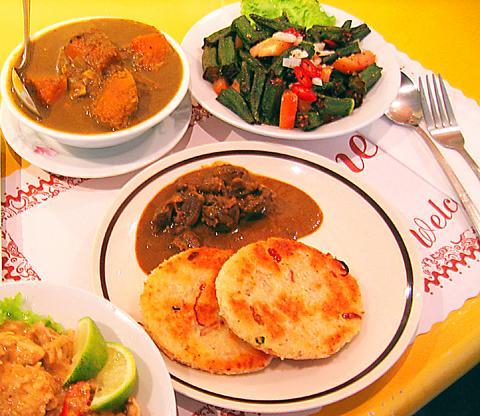Downtown-dwelling Indian curry lovers fed up to the back teeth with having to fork out thousands of NT dollars for a run-of-the-mill slap-up meal should take a trip across the "Gulf of Manner," or the Waishuang River (外雙溪) and check out the Lanka Restaurant.
Located opposite Yangming Hospital (陽明醫院), the restaurant was opened by Damian Chee (齊興盛), an overseas Chinese from Sri Lanka whose father once owned a Chinese restaurant in Colombo, 15 years ago.

PHOTO: GAVIN PHIPPS , TAIPEI TIMES
Once a hangout for illegal Sri Lankan workers until the early 1990s, when many of them were deported, the joint has built up a reputation with both locals and expats alike as one of the cheapest and tastiest authentic curry joints in town.
At the Lanka, diners can forget about the fancy trappings of many a Taipei curry eatery, as the interior is sparsely decorated and the fittings are not that far removed from your average local mom-and-pop diner. But then the Lanka, unlike the lush green mountainous country from whence its proprietor hails is not a place to enjoy vistas -- it is a place to eat.
Using two different types of curry powder -- regular and roasted -- and with the addition of differing proportions of spices such as cardamom, cumin and coriander as well as coconut milk, Sri Lankan curries are lighter than their gee- and yogurt-heavy Indian brethren.
The Lanka's menu is extensive, offering diners the choice of a selection of set meals which cost from NT$175 to NT$200, or individual dishes which cost an average of NT$150. Mildly spicy meat dishes cost NT$130 while the varied selection of vegetable curries -- -- which include spinach, potato, lentil, a tasty pumpkin and an interesting mushroom and cashew nut -- cost between NT$90 and NT$110.
For diners looking to experiment, then one of Chee's sambols, or Sri Lankan salads, makes for a refreshing way to begin any meal. Costing from NT$90 to NT$110, the zesty chili and lemon-loaded salads are available in half a dozen varieties, of which the okra comes highly recommended. Other traditional Sri Lankan treats include spiced tomato palandies (NT$230 - NT$250) and poories NT$140/60), or lightly fried bread.
Unlike Indian eateries, where the nan bread is king, at the Lanka it is the roti that supplements the meal, at NT$70 for a pair.

As Taiwan’s second most populous city, Taichung looms large in the electoral map. Taiwanese political commentators describe it — along with neighboring Changhua County — as Taiwan’s “swing states” (搖擺州), which is a curious direct borrowing from American election terminology. In the early post-Martial Law era, Taichung was referred to as a “desert of democracy” because while the Democratic Progressive Party (DPP) was winning elections in the north and south, Taichung remained staunchly loyal to the Chinese Nationalist Party (KMT). That changed over time, but in both Changhua and Taichung, the DPP still suffers from a “one-term curse,” with the

William Liu (劉家君) moved to Kaohsiung from Nantou to live with his boyfriend Reg Hong (洪嘉佑). “In Nantou, people do not support gay rights at all and never even talk about it. Living here made me optimistic and made me realize how much I can express myself,” Liu tells the Taipei Times. Hong and his friend Cony Hsieh (謝昀希) are both active in several LGBT groups and organizations in Kaohsiung. They were among the people behind the city’s 16th Pride event in November last year, which gathered over 35,000 people. Along with others, they clearly see Kaohsiung as the nexus of LGBT rights.

Jan. 26 to Feb. 1 Nearly 90 years after it was last recorded, the Basay language was taught in a classroom for the first time in September last year. Over the following three months, students learned its sounds along with the customs and folktales of the Ketagalan people, who once spoke it across northern Taiwan. Although each Ketagalan settlement had its own language, Basay functioned as a common trade language. By the late 19th century, it had largely fallen out of daily use as speakers shifted to Hoklo (commonly known as Taiwanese), surviving only in fragments remembered by the elderly. In

Dissident artist Ai Weiwei’s (艾未未) famous return to the People’s Republic of China (PRC) has been overshadowed by the astonishing news of the latest arrests of senior military figures for “corruption,” but it is an interesting piece of news in its own right, though more for what Ai does not understand than for what he does. Ai simply lacks the reflective understanding that the loneliness and isolation he imagines are “European” are simply the joys of life as an expat. That goes both ways: “I love Taiwan!” say many still wet-behind-the-ears expats here, not realizing what they love is being an